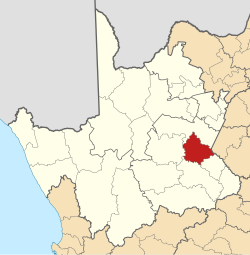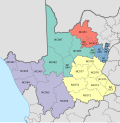Thembelihle Local Municipality
Thembelihle | |
|---|---|
 Location in the Northern Cape | |
| Coordinates: 29°45′S 23°45′E / 29.750°S 23.750°E | |
| Country | South Africa |
| Province | Northern Cape |
| District | Pixley ka Seme |
| Seat | Hopetown |
| Wards | 4 |
| Government | |
| • Type | Municipal council |
| • Mayor | (ANC) |
| Area | |
| • Total | 8,023 km2 (3,098 sq mi) |
| Population (2011)[2] | |
| • Total | 15,701 |
| • Density | 2.0/km2 (5.1/sq mi) |
| Racial makeup (2011) | |
| • Black African | 15.2% |
| • Coloured | 70.7% |
| • Indian/Asian | 0.5% |
| • White | 13.1% |
| First languages (2011) | |
| • Afrikaans | 90.4% |
| • Xhosa | 5.1% |
| • English | 1.3% |
| • Tswana | 1.3% |
| • Other | 1.9% |
| Time zone | UTC+2 (SAST) |
| Municipal code | NC076 |
Thembelihle Local Municipality (formerly known as Oranje-Karoo Local Municipality) is a local municipality in the Pixley ka Seme District Municipality district of the Northern Cape province of South Africa. Thembelihle is a Xhosa name meaning "good hope".[4]
Main places
The 2011 census divided the municipality into the following main places:[5] Although Orania lies within the borders of the Thembelihle Local Municipality, Orania is not administrative part of Thembelihle. The Thembelihle Local Municipality does not see Orania as part of their municipal area.[6]
| Place | Code | Area (km2) | Population | Most spoken language | Remarks |
|---|---|---|---|---|---|
| Hopetown | 374001 | 73.86 | 10,259 | Afrikaans | |
| Strydenburg | 374004 | 37.98 | 2,987 | Afrikaans | |
| Orania | 374003 | 8.95 | 892 | Afrikaans | For census and demarcation purposes only[6] Orania has its own municipal administration |
| Remainder of the municipality | 374002 | 7,902.28 | 1,563 | Afrikaans |
Politics
The municipal council consists of seven members elected by mixed-member proportional representation. Four councillors are elected by first-past-the-post voting in four wards, while the remaining three are chosen from party lists so that the total number of party representatives is proportional to the number of votes received.
For most of the time since its creation in 2000 Thembelihle has been governed by the African National Congress (ANC), which won outright majorities in the 2000, 2006 and 2011 municipal elections. The opposition took control of the council in December 2011, however, after ANC lost a by-election to an independent candidate. The independent, former ANC member Danny Jonas, became the new mayor of the municipality supported by the Congress of the People and the Democratic Alliance.[7] Jonas later joined the Economic Freedom Fighters (EFF).
In the election of 3 August 2016 the ANC regained control of the municipality, winning a majority of four seats on the council.
The following table shows the results of the 2016 election.[8][9]
style="width: 2px; color:inherit; background-color: #006600;" data-sort-value="African National Congress" | style="width: 2px; color:inherit; background-color: #005BA6;" data-sort-value="Democratic Alliance (South Africa)" | style="width: 2px; color:inherit; background-color: #852A2A;" data-sort-value="Economic Freedom Fighters" | style="width: 2px; color:inherit; background-color: #FFCA08;" data-sort-value="Congress of the People (South African political party)" | style="width: 2px; color:inherit; background-color: #FF6600;" data-sort-value="Freedom Front Plus" | style="width: 2px; color:inherit; background-color: #DCDCDC;" data-sort-value="Independent (politics)" | style="width: 2px; color:inherit; background-color: lightgrey;" data-sort-value="Khoisan Revolution" || Party | Votes | Seats | ||||||
|---|---|---|---|---|---|---|---|---|
| Ward | List | Total | % | Ward | List | Total | ||
| ANC | 3,111 | 3,120 | 6,231 | 54.9 | 4 | 0 | 4 | |
| DA | 1,265 | 1,328 | 2,593 | 22.9 | 0 | 2 | 2 | |
| EFF | 641 | 660 | 1,301 | 11.5 | 0 | 1 | 1 | |
| COPE | 267 | 311 | 578 | 5.1 | 0 | 0 | 0 | |
| VF+ | 215 | 216 | 431 | 3.8 | 0 | 0 | 0 | |
| Independent | 146 | – | 146 | 1.3 | 0 | – | 0 | |
| Khoisan Revolution | 31 | 35 | 66 | 0.6 | 0 | 0 | 0 | |
| Total | 5,676 | 5,670 | 11,360 | 100.0 | 4 | 3 | 7 | |
| Spoilt votes | 96 | 138 | 234 | |||||
Inhabitants of Orania elect their own transitional representative council,[10][11] with only a few of its residents choosing to also vote in the elections for the municipal council of Thembelihle.[12][13]
Status of Orania
Although the Afrikaner-only town of Orania officially lies within the geographical borders of the Thembelihle municipality, it is not governed by the Thembelihle municipality. Orania is the only town in South Africa that still has its own transitional representative council in place.[14] These transitional representative councils were the common form of local government in South Africa between 1994 and 2000.
In 2000 the South African government created a new form of local government with a municipal system. In general these municipalities are a combination of several towns and villages. In the process of this merger, the South African provincial governments informed local transitional representative councils about the intended merger and held a deliberation process, after which a final decision was made. These decisions - with the intended abolition of the transitional representative councils - were published in the provincial government gazettes.

In the case of Orania the provincial government of the Northern Cape did not publish the intended abolition of the Orania Transitional Representative Council, which was a legal obligation for a merger with Hopetown and Strydenburg into one single municipality.[15] Since the provincial government learnt of this mistake, it has published a notice in the provincial gazette announcing its intention to abolish the Orania Transitional Representative Council. There was a possibility to object this announcement till 30 November 2000. Objections were sent in by Orania that day. When the Northern Cape government could not react in time, the Orania Transitional Council went to court. This lawsuit was handled by the Northern Cape High Court on 4 December 2000, one day before the nationwide local elections.[15] In the light of the 1994 Accord on Afrikaner self-determination[16] and the mistake of the South African government to not publish the abolition of the Orania Transitional Representative Council it was very likely that Orania would win the case, with the result that the High Court would cancel the elections scheduled for the next day.
Therefore, the case was settled between Orania and the South African government. This agreement was affirmed by the Northern Cape High Court that same day. They agreed that:[10][11]
- The Orania Transitional Representative Council will remain in place indefinitely[17] and will not be dissolved by the South African government by the implementation of the Municipal Structures Act (Act 117 of 1998);
- The Orania Transitional Representative Council will remain in place with all its powers until there is an agreement between the South African government and the inhabitants of Orania about the status of Orania.;
- Orania will lie within the geographical borders of the Thembelihle municipality, but the Thembelihle municipality will not have any power within the area that is governed by the Orania Transitional Representative Council. The Thembelihle municipality will not deliver any services in Orania.
Therefore, citizens of Orania do not vote in elections for the municipal council of the Thembelihle municipality, but they vote for their own transitional representative council on the same day as the local elections.[10] In April 2001 a commission was installed by the South African government on the question of Orania's municipal status.[18]
As of 2016 the negotiations about the status of Orania are still not finalised. This special status of Orania only exists at the local level. At the provincial and national level Orania is integral part of the South African political system.
References
- ^ "Contact list: Executive Mayors". Government Communication & Information System. Archived from the original on 14 July 2010. Retrieved 22 February 2012.
- ^ a b "Statistics by place". Statistics South Africa. Retrieved 27 September 2015.
- ^ "Statistics by place". Statistics South Africa. Retrieved 27 September 2015.
- ^ South African Languages - Place names
- ^ Lookup Tables - Statistics South Africa
- ^ a b Draft Budget for 2016, Thembelihle Local Municipality, April 2015, page 382, Retrieved 13 June 2017
- ^ http://www.dailymaverick.co.za/article/2011-12-09-by-elections-the-da-and-cope-learn-how-to-steal-anc-marbles-by-and-by/
- ^ "Results Summary – All Ballots: Thembelihle" (PDF). Independent Electoral Commission. Retrieved 8 June 2017.
- ^ "Seat Calculation Detail: Thembelihle" (PDF). Independent Electoral Commission. Retrieved 8 June 2017.
- ^ a b c "Eie munisipale verkiesing" (in Afrikaans). Orania Beweging. Retrieved 5 June 2016.
- ^ a b Orania Transitional Representative Council and the Orania Inhabitants Association vs. The President of the Government of the Republic of South Africa and 47 others, Northern Cape High Court, 1148/2000.
- ^ "Despite boycott, few cast vote in Orania". Mail & Guardian. Retrieved 5 June 2016.
- ^ "Orania goes to the polls - differently". Independent Online. Retrieved 8 June 2017.
- ^ "Mufamadi meets Orania representatives". News24. Retrieved 5 June 2016.
- ^ a b "Orania court action looming". News24. Retrieved 5 June 2016.
- ^ See Accord on Afrikaner self-determination, Department of Justice and Constitutional Development, Government of South Africa.
- ^ "Orania retains status quo". News24. Retrieved 5 June 2016.
- ^ "Statement on Cabinet meeting of 4 April 2001". Government Communications (GCIS). Retrieved 5 June 2016.



